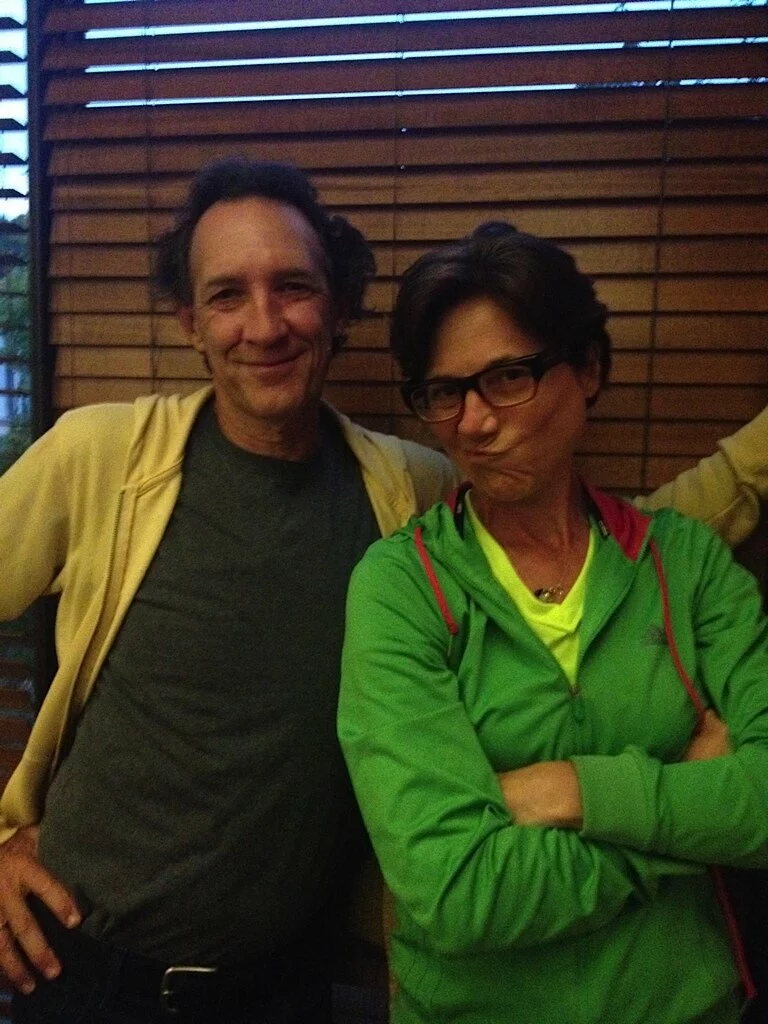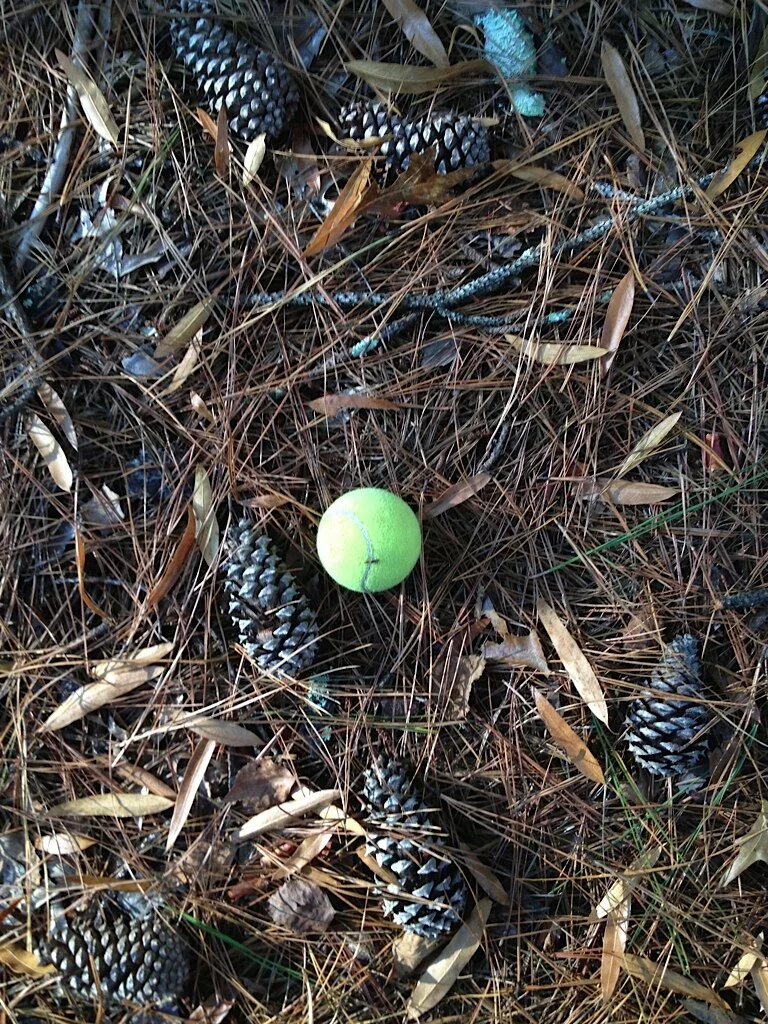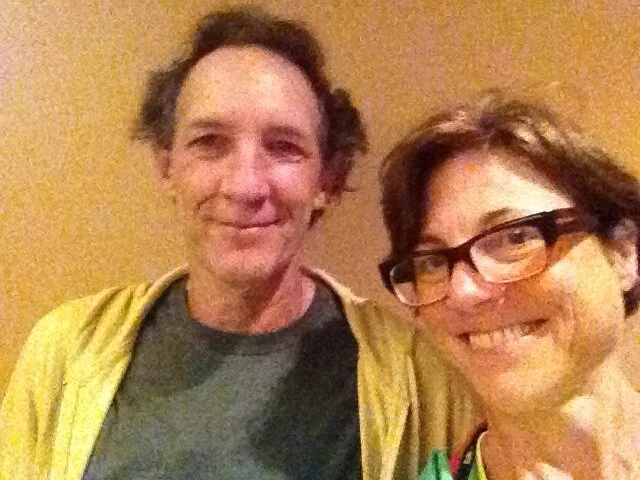US Tennis Congress: Tennis Hate Takes Center Stage
 Amy Eddings Posted on
Amy Eddings Posted on  Friday, November 1, 2013 at 11:00AM
Friday, November 1, 2013 at 11:00AM
An audience of Haters, more than 50 strong, elbowed their way into an auditorium in beautiful Peachtree City, Georgia to join me in a group gripe about their tennis games. Those passing by the panel discussion, held October 12 at the inaugural US Tennis Congress, could hear the collective grinding of teeth and mental gears, like the "monsterous machine running without oil" of the Orwellian Two Minute Hate.
 Mental tennis guru Bob Litwin is trying to ruin my Tennis Hate Zen.
Mental tennis guru Bob Litwin is trying to ruin my Tennis Hate Zen.
I was so proud of us.
We let it all hang out, me included, before three Saintly Pros of the mental game: 10-time Grand Slam winner Anne Smith; former pro, multiple senior national champion and sports head shrinker Jeff Greenwald; and the 2013 Men's 65 grass court singles and doubles national champ, USTA Eastern Tennis Hall of Famer and mental performance coach Bob Litwin.
They sat on a small dais, facing us, the fearful, the angry and the bewildered, for a session titled "Mastering the Mental Game." As the moderator of this discussion, Haters, I did my damnedest to represent I Hate Tennis at its hateful best.
 Cluttered and prickly, just like my Tennis Hate: a stray ball at the Dolce Atlanta - Peachtree City tennis courts.These Pollyannas weren't going to get me to break a smile and lighten up. Hell, I've got a reputation to uphold! No, Haters, I was going to prove to them that some nuts can't be cracked. I'd prove to them the wispiness of their wishful thinking, the quaintness of their naivete.
Cluttered and prickly, just like my Tennis Hate: a stray ball at the Dolce Atlanta - Peachtree City tennis courts.These Pollyannas weren't going to get me to break a smile and lighten up. Hell, I've got a reputation to uphold! No, Haters, I was going to prove to them that some nuts can't be cracked. I'd prove to them the wispiness of their wishful thinking, the quaintness of their naivete.
I got nowhere with them. But they got somewhere with me.
I have always thought that I'd cure my Tennis Hate by becoming better at the game. If my strokes were stronger, if I had a reliable weapon, if I developed some consistency, if I was more successful, I wouldn't be so down on myself. Ten years later, after hundreds of hours of lessons and thousands of dollars' worth of clinics, I'm still not where I want to be. And that gets the Tennis Hate churning even more, because now, I'm doubly frustrated. I not only suck, I suck after a decade of trying NOT to suck.
From Smith, Litwin and Greenwald, I learned that I've been approaching the solution to Tennis Hate ass-backwards. My mental game doesn't get better because my forehand is getting stronger and more consistent. My forehand and other strokes get better as I become more adept at handling my emotions.
"You can have the best technique, but if you can't control your emotions. if you get all upset and don't have good body language and can't keep your intensity level where it needs to be, your technique won't matter," said Smith.
We only had an hour, and I had a list of questions the length of my arm, some culled from a pre-Congress questionnaire that participants had filled out.
* "How can I play as well as I practice?"
* "How can I avoid choking, especially when I'm trying to close out a set or a match?"
* "How do you train your mind to go for your shots, regardless of the outcome, even if that outcome is losing the game, the set or the match?"
And this one, which got a chuckle from the audience when I asked it:
* "If confidence comes from past successes, how can I get confident when I'm losing all the time?"
I'll riff off this last question as a way of illustrating the different approaches Greenwald, Litwin and Smith bring to the mental game.
For Saintly Pro Anne Smith, it's about acting as if. Body language is one of the four keys she teaches through her Mach4 training system. (Mind set -- or self-talk -- intensity level and cueing language, like "strings down" as she preps for her forehand, are the others.)
Want to feel more confident on the court? said Anne. Act like you're confident. That's right. Pretend. Shoulders back, head high, confident stride during the changeovers.
I always thought I'd cure my Tennis Hate by getting better at the game. Turns out I was approaching the solution ass-backwards.
It reminded me of the aphorism, "move a muscle, change a thought."
All three panelists were quick to point out that I can't be confident about winning. I'm skating on thin emotional ice if I base my confidence -- or my self-worth, for that matter -- on future outcomes like winning or losing. I build my confidence on the things I can control. And I can best control my thinking.
"Be confident about choosing your reactions on the court," said Greenwald. "Get better at that, at being looser [no, Haters, not loser, there's another "o" in there], at dropping tension, at committing to hitting through the ball.
"The thought that you're having doesn't have the last say."
 Rewriting my story already: smiling with Bob Litwin.Move a muscle, change a thought. In Greenwald's case, the muscle movement comes with noticing tension. He encouraged us Haters to scan our bodies for tightness, especially in our necks, shoulders and forearms, as we get ready to serve or return. Just by acknowledging its presence, the tension melts away. He said this technique is much more effective that telling yourself to relax.
Rewriting my story already: smiling with Bob Litwin.Move a muscle, change a thought. In Greenwald's case, the muscle movement comes with noticing tension. He encouraged us Haters to scan our bodies for tightness, especially in our necks, shoulders and forearms, as we get ready to serve or return. Just by acknowledging its presence, the tension melts away. He said this technique is much more effective that telling yourself to relax.
Bob Litwin initially threw me with his take on my confidence question. "Confidence," he said, "is what I can reasonably expect of myself." He's confident, for example, in his second serve. He said he makes about 99% of them.
Oh no. My heart sank. Isn't that results-oriented? If I've got to base my confidence on the consistency of my shots, I'm in deep doo-doo.
But Litwin wasn't finished. He gave another example, one I have often felt. "Whenever we [he and his wife Jo Ann] go into New York City, I'm confident I'm going to find a parking spot right in front of our destination. It doesn't mean I'll always get one. But that doesn't stop me from driving directly to the restaurant, or wherever we're going."
I've done that. Driving home from work, I visualize a nice, wide-open space in front of our building. I dont fret or worry about whether one is going to be there, or seethe at the prospect of circling the block several times. Why do that? I'm better off expecting good things to happen. I've got, as Litwin said, a "story," and it goes like this: I get what I need from the Universe, when I need it. At least, when it comes to parking.
Tennis? Now that's another matter.
Litwin suggests we Haters get clear of the story we tell ourselves about tennis, and then, like Jeff Greenwald, make a choice. Choose to write a different story.
"All the things you hate about tennis," he said, looking at me, "are the reasons I love it." He loves the challenge of getting consistent, of figuring out a Worthy Opponent. His story, his mission statement, includes the desire "to see the perceived pressure moments as the sweetest moments" and "to love the competition more than I love to win and to accept whatever the outcome with dignity and class."
Guess that means no pouting and no racquet-breaking.
Haters, we've got some work to do. I'm going to uncover my current, Hate-inducing tennis story and, yes, in the let-it-all-hang-out spirit of social media, share it with y'all! A selfie with words! But I'm also going to write a new story. I'll post that, too.
Haters, join me. Let's write a new story for the new tennis season. We've got a few weeks before the professional tennis season officially begins anew for -- already? -- 2014. I'll be sharing Bob Litwin's strategies for articulating your current tennis story and for writing a new one. Use them, and tell me what you found.
Because I've got a story we're in this together, and together, we can encourage each other to be the best competitors we can be, both on and off the court.
 US Tennis Congress,
US Tennis Congress,  mental,
mental,  mental tennis,
mental tennis,  tennis hate | in
tennis hate | in  Mental Tennis,
Mental Tennis,  Saintly Pros,
Saintly Pros,  Tips,
Tips,  US Tennis Congress
US Tennis Congress


Reader Comments